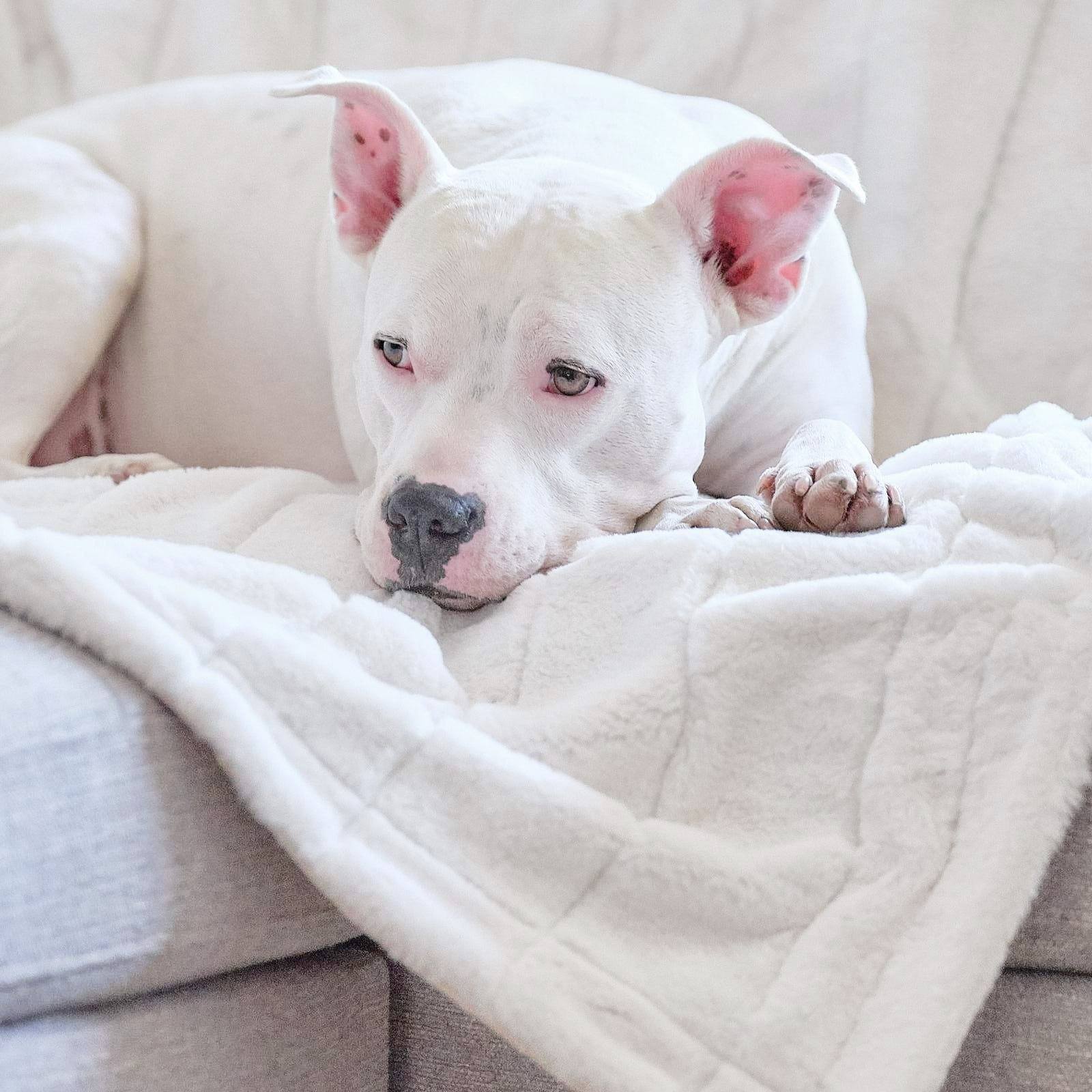Dog Science Series: What Are the Signs of Anxiety in Dogs?

Dogs, like people, may suffer from significant levels of anxiety. At first, you may not notice your dog's symptoms. You may have noticed some slight signs of separation anxiety, but not realize that you have an anxious dog even as signs of anxiety increase. Are you seeing worrisome symptoms in your pet, including changes in your dog's behavior during thunderstorms or when loud noises occur? Learning how to identify those signs of anxiety can help you cope with dog anxiety in your home.
Understanding dog anxiety
Dogs may find themselves struggling with high stress levels and chronic anxiety just like people can. While poor socialization or abuse can increase the risk of anxiety in a dog, sometimes, signs of anxiety in dogs can emerge with no clear cause. Instead, you may simply find that your furry friend has a more anxious personality, or struggles with certain stimuli, including loud noises, being alone, or having unfamiliar people in the house.
Sometimes, you may want your dog to have anti-anxiety medication. Anxiety is a medical condition, and treating it can help relieve those symptoms of anxiety and make your pet more comfortable. In other cases, behavioral modification options can help ease anxiety symptoms at home. Using an orthopedic dog bed, for example, may help alleviate your dog's joint pain, which can help eliminate some signs of anxiety in older dogs.
Types of anxiety
Dogs may struggle with different types of anxiety, depending on their unique personalities.
- Fear-related anxiety may come from specific triggers, including strange people or animals or sudden, loud noises. New experiences may also trigger fear-related anxiety in your pet.
- Separation anxiety can make it difficult for animals to function when separated from their "packs." Dogs with separation anxiety may show more signs of anxiety when left at home alone.
- Dogs with age-related anxiety may have anxiety symptoms related to aging. They may show more signs and symptoms of anxiety as their physical health declines.
How do I know my dog has anxiety?
Pet owners may notice several signs that a pet is suffering from anxiety.
- Your dog may show signs of aggression, including excessive barking, growling, or even going after humans and other animals. Pet parents may notice a sudden increase in aggressive behavior when anxiety triggers are present.
- Your dog may engage in destructive behavior. Dogs with separation anxiety, for example, may be more likely to destroy things when left at home alone.
- You may notice more overall behavior problems in your dog. Often, your dog will deliberately engage in bad behaviors to get your attention. Other times, your dog may behave badly due to the anxiety itself, which may cause your dog to behave in unexpected ways.
- Your dog may have physical symptoms of anxiety like drooling or panting more often. You may also notice more lip licking.
- Your dog may engage in urination or defecation more often, or in inappropriate locations. For example, a house-trained dog might start to urinate or defecate in the house.
- You may notice that your dog paces or seems more restless when anxiety runs high.
- Some dogs will engage in repetitive behaviors in an effort to stem anxiety. Often, that means doing the same thing repeatedly in an effort to calm down.
As a pet parent, you may notice any or all of these signs that may suggest that your dog is struggling with anxiety. Talk to your vet if you suspect that your dog has any symptoms of anxiety.
How can you calm an anxious dog?
There are several strategies you can use to help calm anxiety in dogs.
Offer stimulation.
Puzzle toys can help provide stimulation for your dog when you aren't at home. Going to dog parks can help give your dog a chance to run off extra energy and socialize with other dogs. When dogs are inadequately stimulated, they may struggle more with anxiety.
Try counterconditioning.
Training and counterconditioning can go a long way toward helping alleviate common symptoms of anxiety. Through counterconditioning, you might expose your dog to potential triggers, but provide positive reinforcement. You might also work with a veterinary behaviorist to help with the counterconditioning process and alleviate those symptoms for your dog.
Offer a space where your dog can calm down.
Get a dog bed for your dog and create a space where your dog can calm down on their own, without having to worry about further exposure to potential triggers. If you have an older dog, an orthopedic dog bed, including a small orthopedic dog bed for smaller dogs, can help give your dog a place to get away. Try a dog blanket for the bed to help keep your pet warm and cozy.
Offer reassurance.
Show your dog that there is nothing wrong and that you are in control. This simple step can help them feel much more trusting.
FAQ
Have questions about how to make your dog comfortable or how to choose the best bed for an anxious pup? Contact us to learn more.
How does stress affect my dog?
Immediate stress responses may include urine loss or drooling. Long-term, high levels of stress, including repeated exposure to triggers, may cause greater symptoms of anxiety and even long-term health problems for your dog.
What can cause sudden anxiety in dogs?
Dogs may have a greater risk of suffering from high levels anxiety during times of big change. They may have trouble when new family members are added to the "pack" or when moving. You may also notice that your dog has anxiety after major changes or any type of attack: for example, going to doggy daycare for the first time, or suffering an attack from another dog while away from home.
What are the first signs of stress in a dog?
Stressed dogs often have wide, dilated eyes. They may show changes in body posture that indicate that they are struggling. You may notice your dog cowering, or, depending on your dog's personality, more signs of aggression than normal. Identifying anxiety and acting on it quickly can help keep your dog healthier
Subscribe
Sign up to get the latest on sales, new releases and more…
Categories
- My Dog Is Limping: How to Tell When Rest Is Enough, and When to Call/Visit the Vet
- How to Get a Fearful Dog to Trust You: A Compassionate Guide for Rescue Dogs
- What Is Dog Boarding? A Complete Guide to High-End Stays for Your Dog
- Dog UTI Symptoms: How to Spot, Treat, and Prevent Urinary Tract Infections
- Psyllium Husk for Dogs: Science-Based Benefits, Dosage and Use
- Dog Meal Prepping : A Complete Guide to Healthy, Time-Saving Homemade Meals
- Best Places to Take Your Dog on Vacation this 2026(USA Edition)
- Tails of Celebration: Working Dogs of the Lares Trek, A Silent Partnership In Peru
- 5 Easy Organic Christmas Recipes for Dogs: Simple Holiday Treats Your Companion Will Love
- The 6 Best Luxury Gifts for Your Dog This Christmas: Thoughtful Holiday Comfort That Truly Lasts
- Why Playtime Matters: The Benefits of Mental Stimulation and Playtime with Your Companion
- Tails of Celebration: The Miao Dog-Carrying Festival - A Hero's Honor in China
- A Dog-Friendly Thanksgiving 2025: Comfort, Calm, and Easy Treat Recipes
- The Best Dog Beds for Winter 2025: 5 Luxury Styles for Warmth, Comfort & Orthopedic Support
- Tails of Celebration: The Feast of Saint Hubert — Belgium's Timeless Blessing
- Halloween Safety Tips for Dogs: How to Keep Your Companion Safe This Spooky season
- Tails of Celebration: Día de los Muertos / Day of the Dead for Pets, A Festival of Memory in Mexico
- How to Care for Senior Dogs in Fall: Mobility Tips & Joint Support
- Tails of Celebration: Kukur Tihar & The Tihar Festival of Nepal
- What is a VDI Testing for dogs ? : Insights, Procedures and Preventive Measures
- Cheap Dog Beds vs. Luxury Dog Beds: The Real Cost of a $50 "Disposable" Dog Bed
- Can Dogs Have OCD? Understanding Canine Compulsive Behaviors (CCD)
- Does My Dog Like Music? Find Out What Tunes Make Your Pup Wag!
- Effective Solutions for Food Aggression in Dogs
- 7 Frozen Treats Your Dog Will Love This Summer☀️🧊🍉
- The Best Waterproof Liners for Dog Beds: Protect Against Spills, Drool, and Accidents
- How to Cope with the Loss of a Dog: A Tribute to Every Companion We Carry in Our Hearts
- Top Tips on How to Prevent Matting in Dogs
- Understanding and Managing Dogs with Hip Dysplasia
- The Ultimate Guide to Dog Gut Health: Natural Remedies, Probiotic Insights and Signs of Poor Gut Health
- The Best Supplements for Dogs: Explore Top Picks for Canine Health and Wellness
- How Often Should I Brush My Dog's Teeth? Tips for Optimal Canine Dental Health
- Ultimate Guide on How to Comfort Your Dog During Fireworks this 4th of July
- Managing a Blowing Coat: Essential Grooming Tips for Double-Coated Dogs.
- 5 Daily Habits That Boost Your Dog’s Long-Term Wellness
- Mastering Crate Training a Dog: Tips and Benefits
- Dog Car Seats vs. Seat Covers: What’s The Best Option For Your Companion?
- Best Outdoor Dog Beds: Luxury, Durability, and Unmatched Comfort
- Is My Dog Overweight? Tips to Assess and Help Your Companion
- The Best Faux Fur Dog Beds for Ultimate Pet Comfort of 2025
- Dog Running Guide: How to Start, Train & Stay Safe when running with your Dog
- Indestructible Dog Beds? The Truth Behind the Term
- Top Tips for Effective Exercise for Dogs
- Effective Dog Ear Cleaning: A Step-by-Step Guide for Maintaining Healthy Ears
- How to Manage Dog Aggressive Behaviors: Expert Tips and Advice
- Effective Canine Ear Infection Remedies: Symptoms, Causes & Treatments
- How to Make a New Dog Comfortable in Their New Home - 2025 Guide
- Signs of Dog Allergy Symptoms and How to Help and Prevent Them
- Why Does My Dog Lick Their Paws? Causes and Solutions Explained
- Dog Alzheimer's: Symptoms, Causes, and Treatment Options


Leave a comment
Please note, comments must be approved before they are published